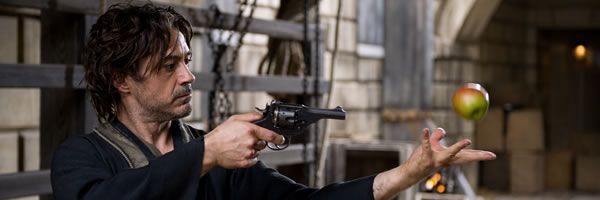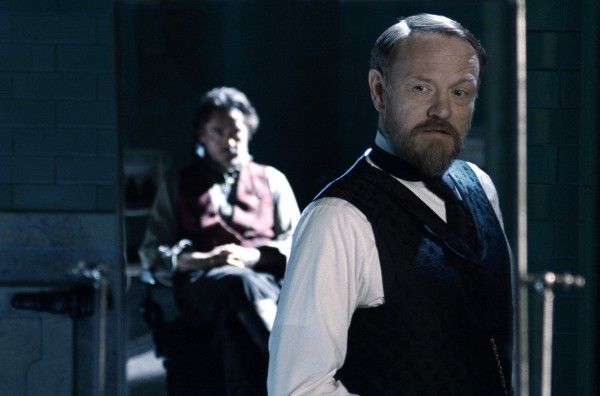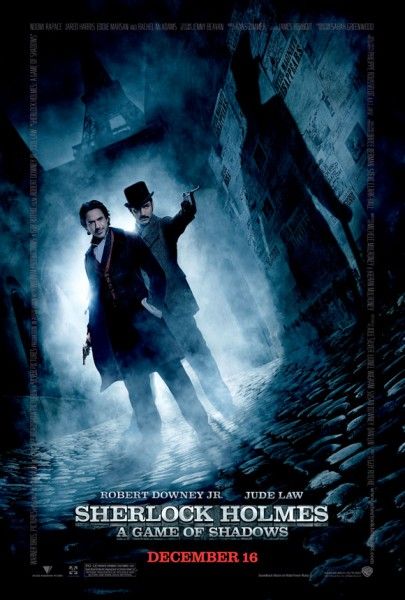The first Sherlock Holmes had to overcome the challenge of readjusting the legendary detective to a modernized version who lived in a jacked-up version of Victorian England. The film was a hit, audiences accepted director Guy Ritchie's re-imagined Sherlock (Robert Downey Jr.), and the sequel moves on to broadening the world, upping the ante, and refining the rough parts of the original. Like its predecessor, Sherlock Holmes: A Game of Shadows is fun, easily-digestible entertainment, but the sequel simplifies the mystery and misses a major opportunity to highlight one of literature's great villains.
The shadow of Holmes' nemesis, Professor James Moriarty, swirled around the first movie, and now he has emerged (played by Jared Harris) to move towards a mysterious endgame. The device Moriarty stole at the end of the first movie has nothing to do with the new story, but grand plans still abound and Holmes has gone even more manic at the possibility of facing off against his equal. He must also deal with the annoyance that Watson (Jude Law) will be leaving for a peaceful married life with Mary (Kelly Reilly). His annoyance turns to serious concern with Moriarty threatens to harm Watson, Mary, and Sherlock's brother Mycroft (Stephen Fry) if Sherlock doesn't back off. Naturally, the cocky detective does no such thing and ropes Watson into the hunt along with a Simza (Noomi Rapace), a gypsy who helps the investigation in order to find her missing brother.
A Game of Shadows reduces the detective aspect of the first film and focuses on playing up the action and the comedy. Ritchie knows his approach worked the first time, and he's all too eager to try to top his already over-stylized visuals. He plays up "Holmes-vision" (Holmes special ability to play out a fight before it even begins), kicks up the speed-ramping even more, and the production design goes right up to the line of a full-blown steampunk aesthetic (full-blown steampunk involves decorating everything with top hats and gears). As with all blockbuster sequels, the mandate is to give the audience bigger set pieces and Ritchie turns in some quality work. Watching Holmes and Watson try to survive a barrage of gunfire on a moving train and then trying to outrun cannon fire through a forest makes for some grand set pieces.
Downey once again plays the character with daffy abandon and his chemistry with Law remains strong. The homoerotic comedy fires on all cylinders and I imagine the third film will have Holmes and Watson making-out for at least 60% of the runtime. Fry gets to steal a little bit of the humor as well, but considering his comic abilities, he feels underutilized. But Fry is practically a lead when compared to Rapace. Rapace was supposed to be a big splash in the states after earning raves for her portrayal of Lisbeth Salander in the Swedish Dragon Tattoo movies, but her character in Shadows is barely present. Simza is merely a plot point and it seems like the need to have a female co-star was more important than giving the female co-star a good character.
But the real crime is wasting Moriarty, because villains can help illuminate our heroes. Moriarty is Holmes without conscience. He's the only person on the planet who can challenge the great detective and A Game of Shadows makes a poor play by shuffling him off to the side. The intent is to make the villain's presence felt even when he's not on screen, but we got that in the first movie. Whenever Moriarty is on screen, Jared Harris steals the spotlight, which is impressive considering he has to contend with Downey, The Charisma Explosion. Matters are made worse when you realize there isn't much of a "game" between the two in the first place. One would think that two geniuses would be more interested in matching wits and trying to deceive the other. But Moriarty's endgame is banal and Holmes' focus is simply trying to keep up with his archenemy's plan. The movie uses chess as a theoretically apt symbol for their conflict since the game is all about thinking as far ahead and understanding every outcome in order to defeat your opponent. In A Game of Shadows, it feels more like Moriarty is the only one with a plan and Holmes is waiting to see the outcome.
Frustrations about Moriarty aside, the sequel delivers on its promise of bigger action and more comedy. It's unfortunate that the script has to sacrifice the complexities of the mystery and the signature villain in order for Ritchie to show every single piece of wood in the world splintering into a billion pieces, but it's not unexpected since the first film was already headed down that path. Sherlock Holmes: A Game of Shadows doesn't play an elegant game of exciting chess, but it's comfortable enough to enjoy a game of exploding checkers.
Rating: B



